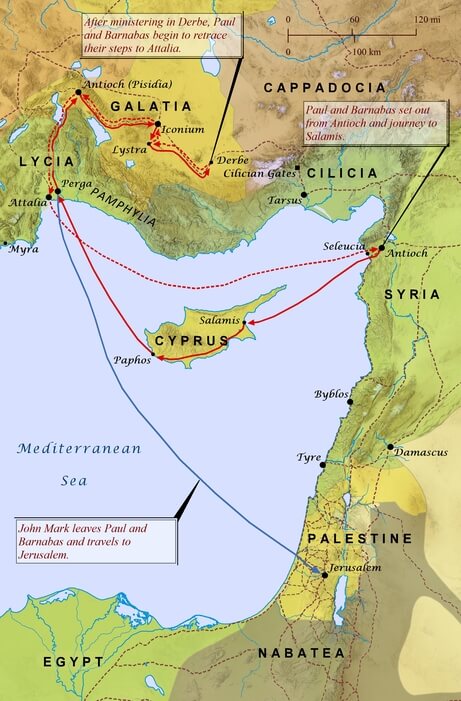Paul starts his address to the churches of Galatia by showing that his qualifications are given by God and not men.
The letter to the churches in Galatia begins with Paul establishing his authority as an apostle. The word apostle simply means “one who is sent.” There were 12 original apostles, who were with Jesus, but Paul was added to their number after Christ’s death, burial, and resurrection. In Acts 9, he sees the glorified Jesus on the Road to Damascus, and was subsequently appointed to ministry by Christ.
Paul was granted authority as an apostle through God and Christ, not through man. This point of authority is key to the arguments Paul makes throughout this letter. Establishing the authority Paul has through Christ shows how he supersedes the competing Jewish “authorities” who have led these Galatian churches away from the truth. These competitors focus on works of the law as a way to make a person right before God, instead of the gospel of Christ’s death as full payment for our sins, and the power of His resurrected life as our means of living.
Unlike his corrective letter to the Romans whom he had not met face-to-face (where Paul also answered slanderous charges from competing Jewish “authorities”), the Galatians were people he had personally ministered to (Acts 18:23). So while the basic arguments in Galatians and Romans have much in common, the tone of Galatians is more like a father scolding a child, whereas Paul’s letter to the Romans takes a far more diplomatic tone.
Galatia likely refers to a region in what is now central Turkey. At the time Paul wrote this letter—which is often placed around 55 AD—these cities would have been Roman colonies, occupied primarily by Greek-speaking Gentiles. The region included cities mentioned on Paul’s missionary journeys in the book of Acts such as Lystra, Iconium, and Derbe. (Acts 14 and Acts 16:1-5). Paul’s disciple Timothy was from Lystra (Acts 16:1).
Biblical Text
1 Paul, an apostle (not sent from men nor through the agency of man, but through Jesus Christ and God the Father, who raised Him from the dead), 2 and all the brethren who are with me, To the churches of Galatia:
Check out our other commentaries:
-
Exodus 22:16-24 meaning
This passage deals with the consequences for someone living a life disloyal to the covenant. The LORD prohibits the abuse of society’s vulnerable—strangers, widows, and...... -
Hosea 3:1 meaning
The LORD commands Hosea to retrieve his wife Gomer in love, even though she is an adulteress. This gracious act illustrates God’s love for Israel...... -
Matthew 10:23 meaning
Jesus tells the disciples to quickly move on to the next town if they face hostility, because even as it is there is not enough...... -
Genesis 8:18-22 meaning
Noah, his family, and all the animals left the ark. Noah built the first altar and offered sacrifices to the Lord. ...... -
Romans 4:16-17 meaning
No one can live up to God’s standard; we are saved by grace through faith. Every person, in every nation who believes is made a......



